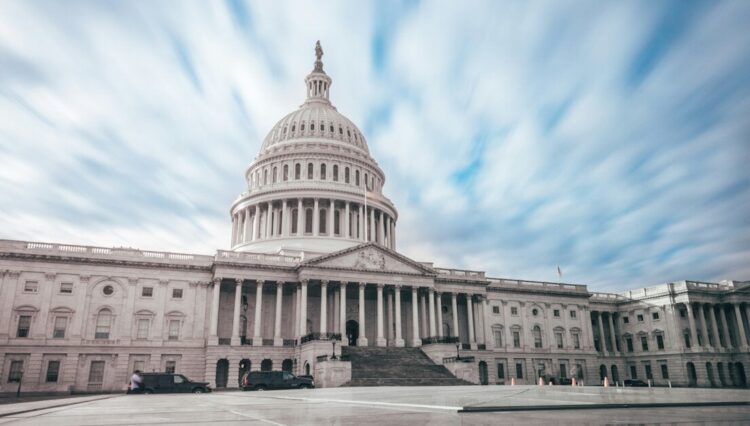The US Senate dealt a blow to the know-how sector early on Tuesday (July 1), voting 99-1 to strip a provision from President Donald Trump’s financial bundle that will have prevented states from regulating synthetic intelligence for a decade.
The rejection alerts a victory to artistic business teams which have campaigned towards what they see as an try to defend AI firms from accountability when utilizing creators’ artwork and music to create AI fashions.
The proposal emerged from considerations {that a} “patchwork” of state and native AI legal guidelines would hinder American AI firms competing towards China. Senator Ted Cruz of Texas, who chairs the Commerce Committee, proposed the measure after securing backing from tech leaders.
Initially designed as a 10-year ban on state AI oversight, Cruz and different lawmakers labored to safe that the supply is included in Trump’s GOP megabill. Supporters of the proposal embody OpenAI’s Sam Altman, Anduril’s Palmer Luckey, and a16z’s Marc Andreessen, in response to TechCrunch.
“Folks will likely be in danger till fundamental guidelines guaranteeing security and equity can go into impact.”
Sarah Huckabee Sanders, Governor of Arkansas
Nevertheless, the proposal drew opposition as additional particulars emerged. Arkansas Governor Sarah Huckabee Sanders, Trump’s former press secretary, rallied Republican governors towards the measure, writing to Senate Majority Chief John Thune and Speaker of the Home of Representatives Mike Johnson final week to take away the AI regulatory moratorium.
Sanders wrote: “Folks will likely be in danger till fundamental guidelines guaranteeing security and equity can go into impact.”
Senator Marsha Blackburn of Tennessee, who initially supported the moratorium, finally partnered with Washington Democrat Maria Cantwell to kill the supply solely.
Regardless of Cruz and Blackburn teaming up to pitch adjustments to the AI moratiorium together with shortening the timeframe to 5 years, Blackburn pullled her help, citing “issues with the language” of the modification.
“Whereas I respect Chairman Cruz’s efforts to search out acceptable language that permits states to guard their residents from the abuses of AI, the present language shouldn’t be acceptable to those that want these protections essentially the most.”
Marsha Blackburn, US Senator
Blackburn on Tuesday mentioned: “Whereas I respect Chairman Cruz’s efforts to search out acceptable language that permits states to guard their residents from the abuses of AI, the present language shouldn’t be acceptable to those that want these protections essentially the most.”
“Once I spoke to President Trump final evening, he mentioned it was a terrific settlement… However outdoors pursuits opposed that deal.”
Ted Cruz, US Senator
Cruz recommended the invoice might have “handed simply” if Blackburn hadn’t withdrawn her help.
“Once I spoke to President Trump final evening, he mentioned it was a terrific settlement,” Cruz was quoted by the Related Press as saying. “The settlement protected youngsters and guarded the rights of artistic artists. However outdoors pursuits opposed that deal.”
The Human Artistry Marketing campaign — which represents recording artists, songwriters, composers, publishers, unbiased document labels, journalists, photographers, actors, athletes and extra — welcomed the choice, arguing that the ban would have prevented states from requiring transparency about whose creative works prepare AI fashions and from blocking unauthorized deepfakes.
“This harmful and unwise proposal would have banned states from passing new laws or implementing present legal guidelines, together with to offer higher transparency about whose artwork was copied to create AI fashions and banning nonconsensual deepfakes and voice clones.”
Human Artistry Marketing campaign
Following the vote, the marketing campaign mentioned in a press release to MBW: “The Human Artistry Marketing campaign is grateful to Senators Blackburn and Cantwell for his or her steadfast help and applauds the Senate’s resounding rejection of AI with out guardrails. This harmful and unwise proposal would have banned states from passing new laws or implementing present legal guidelines, together with to offer higher transparency about whose artwork was copied to create AI fashions and banning nonconsensual deepfakes and voice clones. There’s a higher manner ahead with insurance policies that acknowledge AI could possibly be a helpful instrument aiding human creativity, however ought to by no means be used to destroy artistry and tradition.”
Mitch Glazier, Chairman and CEO of the Recording Business Affiliation of America, additionally welcomed the information, telling MBW: “We applaud Senators Blackburn and Cantwell for his or her persistent management to guard artists and rightsholders – driving a virtually unanimous Senate rejection of a proposed 10-year ban on state-based AI guardrails.”
“This last vote is a convincing dismissal of the shortsighted, zero-sum recreation pondering from some tech firms and signifies a widespread recognition that respect for human creativity doesn’t impede profitable the AI race, however as an alternative is crucial to its success.”
Mitch Glazier, RIAA
Added Glazier: “Federal and state governments each have a important position to play in defending creators whereas selling AI innovation. This last vote is a convincing dismissal of the shortsighted, zero-sum recreation pondering from some tech firms and signifies a widespread recognition that respect for human creativity doesn’t impede profitable the AI race, however as an alternative is crucial to its success.”
The RIAA represents the US recording business, whose members embody main document labels and distributors.
Music Enterprise Worldwide




